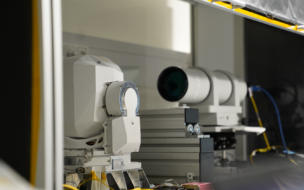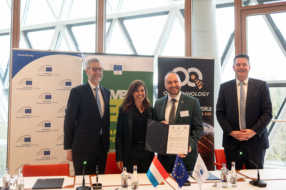The European Commission released its long-awaited proposal for an EU Space Act this week. The act aims to boost the region’s space industry by cutting red tape, creating one standard for legal and technical requirements, and ensuring Europe’s space industry remains safe and sustainable.
The Space Act would create standard operating procedures across the space industry, from launch licensing to satellite safety, if it’s approved by the European Parliament and the Council of the European Union. But how much would space companies in Europe feel the impact of such a widespread policy change?
Cost/benefit: The commission’s impact assessment, which outlines the main effects of the proposed policies, found that the changes would have minimal administrative impact on member states beyond the one-time headache of aligning policies with the Space Act.
The impact on the commercial sector, however, would be more material.
- The assessment found that satellite operators’ manufacturing costs could increase as much as 10%.
- Launch service providers could end up incurring expenses of €1.5M for heavy launchers, and €200,000 for small and medium launchers, to meet the new launch requirements.
- Risk management costs for the industry are estimated at 10% of a company’s IT budget.
- Implementing environmental protection rules would cost as much as €8,000.
On the plus side, having a single market and a single set of rules for all EU member states would answer the complaints of many in the industry, who have criticized Europe’s slow-moving, fragmented regulatory process.
- The assessment estimates that shifting from individual to constellation-wide satellite authorizations could save operators €68M over the next decade.
- Increasing the minimum lifespan of LEO sats from five years to six years could have a €1.3B annual economic benefit.
- Higher cyber security standards could save operators and manufacturers €320M annually.
New checklists: The Space Act isn’t just concerned with boosting the region’s space economy, however. Many of the articles focus on standardizing the technical requirements for launch and satellite operators; the aim is to ensure the region’s space industry is safe, resilient, and environmentally sustainable.
- The act requires that launch operators implement flight safety systems and space debris control measures to ensure safe launch and reentry.
- It mandates that spacecraft operators subscribe to collision-avoidance services, maintain a level of maneuverability, draw up space debris mitigation plans, and do their best to limit light and radio pollution.
- The Space Act asks space operators to calculate the environmental footprint of their entire mission lifecycle, and submit these findings as part of their authorization applications.
- Space operators will be expected to equip themselves with in-space servicing interfaces. They must also follow orbital traffic rules, including new procedures for collision avoidance that follow a “right of way” approach.
Lastly, the Space Act creates a series of supporting measures—guidance materials, technical assistance, and a new digital information portal—to help ease the compliance burden on smaller space companies.





